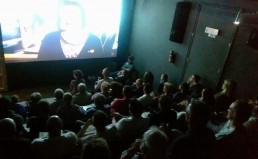Lithuanian Gay League (LGL), main organizer of Baltic Pride 2013, in January appealed the Vilnius City Administration’s decision to issue a permit for the Pride Parade to be held in the isolated location of Upės Street, requesting once again permission for Gedimino Avenue, the main street of Vilnius. In response to the complaint made by LGL, the Police Department under the Ministry of the Interior has expressed its view on the matter to the court, disagreeing with LGL on the location of the parade. The Police Department’s arguments are based mainly on concern for public order and safety and are as follows:
(1) firstly, Gedimino Avenue has many residential and office buildings, which would need to be inspected and from which objects could be thrown into the parade, disrupting public transport. The more spacious Upės Street location would be more favorable for deployment and maneuvers of police force and ensuring public safety;
(2) secondly, the Upės Street location is protected by natural obstacles such as the River Neris on one side, reducing the need for portable fencing;
(3) thirdly, the area is convenient for organizing control posts and check points;
(4) fourthly, holding the parade on Upės Street would be less disturbing for shops, cafes etc, and would not pose a threat to banks, jewellers etc.;
(5) fifthly, police already have experience of ensuring public order and safety in the Upės Street location.
The Police Department further states that the Applicant (LGL) has not submitted any objective arguments stating why the goals of the parade (i.e. promoting and raising awareness of LGBT rights) would not be achieved if the parade was held in a location other than Gedimino Avenue. In response to this statement, LGL wants to reiterate its view that holding the parade at the Upės Street location would be a restriction to the freedom of assembly of LGBT people. The objective of the parade is for LGBT people to be visible, to show the public that LGBT people are an integrated part of the Lithuanian society, and raise awareness of LGBT rights. Being restricted to an isolated and inaccessible location fenced off from the public, this purpose becomes undermined. The Police Department stated that “the wish of the Applicant to exercise his rights only according to his will, ignoring the interests of the society and the state, are an indication not about the aim of achieving the set goals for the Parade, but more about the striving to promote the event through disputes thereto,” showing a blatant lack of understanding of both the objective of the parade and the principle of freedom of assembly.
To justify its arguments, the Police Department refers to the principle of balance in implementing rights, stating that the Lithuanian Constitution and international legislation protect basic rights, but they shall be implemented taking into account the interests of the entire society and not a particular group of people, ensuring that all people around the event are safe and secure and can enjoy their rights without being exposed to excess inconveniences caused by the implementation of the rights of other persons. However, it is not clear from this statement what rights of others would be infringed upon if LGBT people and their allies exercised their constitutional right to freedom of assembly on Gedimino Avenue.
LGL reminds that it is the obligation of the police to protect all groups in society, in this case LGBT people, regardless of hostility towards them in society. It is also the obligation of the police to take necessary preventative measures to ensure order and safety. Police forces very successfully protected and ensured safety in Baltic Pride 2010. There are also good experiences from other cities where Pride Parades have gone ahead in central locations and main streets without security and safety problems, for example Budapest in 2011, Riga in 2012 and Bratislava in 2012. LGL also draws attention to the fact that on a meeting between LGL, Vilnius City Administration and the Police held on January 16 to discuss Baltic Pride, representative of Vilnius Country Police Headquarters Vytautas Grašys stated that safety and security of the parade could be ensured on Gedimino Avenue.
LGL also draws attention to the fact that earlier this month on Lithuania’s Independence Day, nationalist groups, who had also received permission only for Upės Street, held an unsanctioned march on Gedimino Avenue. They received prior warnings from the police, but had full police protection, and after the event mayor Arturas Zuokas hinted that permission may be granted to them next year for Gedimino Avenue.
The full translation of the Police Department’s submission to the Court here.
Vilnius Regional Administrative Court will convene on 27 March 2013 at 2 pm to handle the complaint made by LGL.



